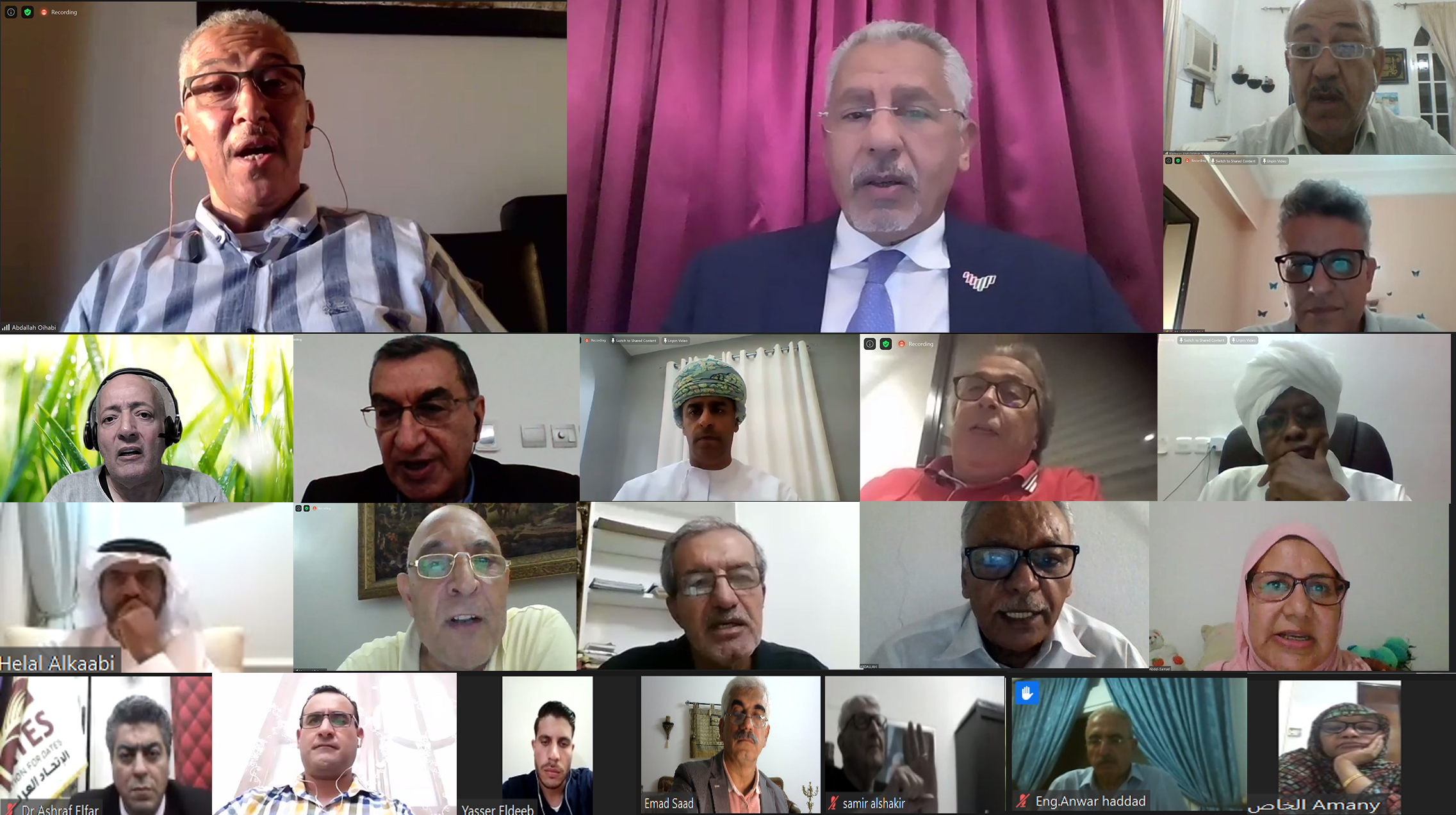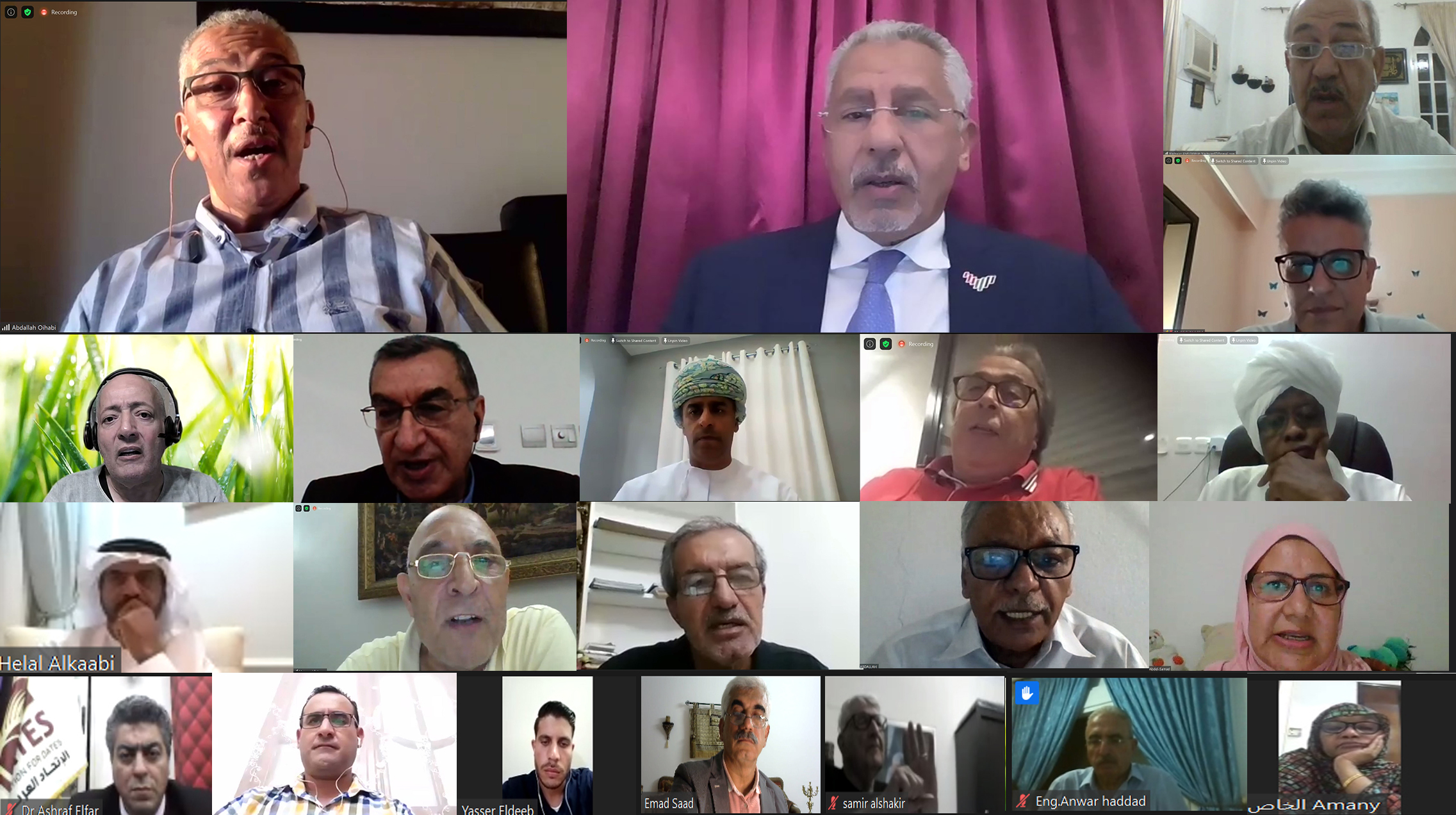
Award Program
Khalifa Award News
Abu Dhabi Date Palm Exhibition News
Egypt Festival News
Jordan Festival News
Sudan Festival News
Morocco Festival News
Mauritania Festival News
Mexico Festival News
Pakistan Festival News
International Conference News

“Khalifa International Award” invites international experts to present scientific virtual lectures on:
“Dates Value Chain and International Marketing”
The UAE occupies a leading global role in the export rates compared to the amount of dates produced.
The traded dates quantity in the international market is estimated to be 1.4 million tons, with a value of 1.97 billion USD.
Khalifa International Award for Date Palm and Agricultural Innovation organized a virtual lecture, presenting “Dates Value Chain and International Marketing”, by Dr. Abdallah Oihabi, International Advisor, Former FAO Country Representative in KSA, on Sunday the 11th of October, 2020. The lecture was attended by (78) participants, representing (12) Arab countries, among which are members of the Date Palm Friends Society in the UAE, date palmfarmers, and Agricultural experts.
This virtual lecture held via Zoom, comes under the directives of His Highness Sheikh Nahayan Mabarak Al Nahayan, Minister of Tolerance and Coexistence, President of the Award’s Board of Trustees, and within the Award’s framework and commitment to spread the scientific knowledge and awareness on the Date Palm Best Practices, and providing technical and scientific advice and support to farmers to help them improve the Dates quality. Dr. Abdelouahhab Zaid, the Award’s Secretary General, expressed his appreciation to the extended scientific and professional efforts made by Dr. Abdallah Oihabi, as he is an international Expert in the field of Date Palm cultivation, date production and marketing, where Dr. Oihabi held the Managing Director of the FAO Coordination Officein KSA position for more than 12 years.
From his side, Dr. Abdallah Oihabi highlighted during the lecture that the Dates value chain in the Middle East and North Africa regions consists of 6 main factors and several other supporting factors. The first factor is the multiplication and production of offshoots: where most commercial farms depend on date palms produced by tissue culture, while the use of offshoots is widely used among small scale farms. The Second factor is production: where most production obstacles faced are due to the absence of knowledge of the good agricultural practices, The Third factor is harvesting: where the old traditional methods are still overtaking the harvesting operations, The Fourth factor is sorting and packaging: some of the main practices that has been noticed is the absence of in field sorting, Dates preservation refrigerators in harvest areas, and the incompatibility of most of the sorting and packaging stations with international specifications and standards, The Fifth factor is manufacturing: as the manufacturing process is not given needed attention, and The Sixth and final factor is marketing: the lack of marketing experience, weak international marketing and low revenue outcome from the internal marketing of small scale farms.
Dr. Oihabi, then referred to valuable information on the Dates international marketing, as the quantity of dates traded in the international market during the period 2009-2018 moved from 660 thousand tons to about 1.4 million tons, while during the period 2009-2018 the annual percentage of dates traded in the international market ranged between 10% and 19% of the total produced dates. While the export rates during the period 2009-2013, reached 9.82% of the total annual global dates production, and increased during the last five years to 17.38%, where the growth rate reached 6% during the same period.
Moving forward, Dr. Oihabi then shared statistical information issued by the FAO of the United Nations and the World Trade Center on the quantity of the World’s produced dates and the amount traded in the international market. Where the global dates production in 2018 was estimated to be 8,536,218 tons, while the traded dates quantity in the international market announced by the World Trade Center in the same year, was 1,561,827 tons, which reflects the amount of surplus dates, including domestic consumption, of 7,152,638 tons. Where the world’s ranking of date exporting countries was as follows: in the first place was Iran as the first exporter in terms of quantity with 306,291 tons, followed by Iraq with 265,352 tons, the UAE with 200,887 tons, and Saudi Arabia with 161,966 tons.
Dr. Oihabi, then highlighted the international marketing of the dates distribution value, where it was indicated that the value of dates traded in the international market in 2018 was worth 1.97 billion USD, and the growth rate during 2015-2018 was 10%, of which Iran owned 17.17%, Tunisia 16.30%, Saudi Arabia 10.22 %, and the UAE 10%. It was also indicated that Iraq’s share did not exceed 5.45% while it is considered the second largest exporter in terms of quantity, and Egypt did no Exceed 2.54%, and it is the one of the largest producers of dates.
Dr. Oihabi then concluded the lecture by highlighting the great role played by the Khalifa International Award for Date Palm and Agricultural Innovation in supporting and developing the date palm cultivation sector and the date production worldwide, through the organizing Jordan International Date Palm Festival, Sudan International Date Palm Festival, and Egypt International Date Palm Festival and the accompanying activities and events. Which actively contributed to the increase the reputation of the Arab dates and the volume of exports, in addition to the series of international conferences organized by the Award’s General Secretariat for over twenty years.












